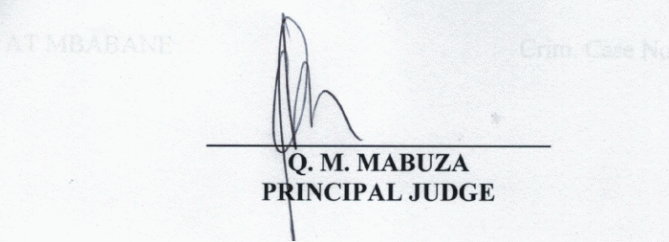
IN THE HIGH COURT OF ESWATINI
HELD AT MBABANE CASE NO. 132/19
In the matter between:
ETHEL SIBONGILE DUBE APPELLANT
VS
THE KING RESPONDENT
Neutral Citation : Ethel Sibongile Dube vs The King (132/19) [2019]
SZHC 124 (16 JULY 2019)
Coram : MABUZA – PJ
Heard : 16 APRIL 2019
Delivered : 16 JULY 2019
SUMMARY
Criminal Law: Appellant lodged an appeal to this Court against
sentences by the Magistrate’s Court sitting at
Manzini.
JUDGMENT
MABUZA -PJ
[1] Serving before me is an appeal by Ms. Dube. It is opposed by the Respondent.
[2] Ms. Dube was charged before the Manzini Magistrates Court with two counts of theft by false pretences namely:
Count 1
The Accused is charged with the offence of Theft by False Pretences.
In that, upon or about May 2017 and at or near Manzini area in the Manzini region, the accused person did unlawfully and with intent to defraud and to steal, misrepresent to Leonard Mhlanga in that she sold him a portion of land amounting to E80,000.00 at Kwaluseni area which she had already sold to another person thus the Accused did steal, misrepresent to the said Leonard Mhlanga and induced him to the sum of E80,000.00 whereas when she made the aforesaid misrepresentation well knew that the land did not belong to her, thus did commit the crime of Theft by False Pretences.
Count 2
The Accused is charged with the offence of Theft by False Pretences.
In that. upon or about the month of July 2017 and at or near Manzini area in the Manzini region, the said accused person did unlawfully and with intent to defraud and to steal, misrepresent to Nontsikelelo Ndwandwe in that she sold her a portion of land amounting to E120,000.00 at Kwaluseni area which she had already sold to another person thus the said Accused did steal, misrepresent to the said Nontsikelelo Ndwandwe and induced her to the sum of E60,000.00 which was a deposit whereas when she made the aforesaid misrepresentation well knew that the land does not belong to her, thus did commit the crime of Theft by False Pretences.
[3] She was convicted and sentenced as follows:
Count 1:
Four years imprisonment without the option of a fine, half of the sentence suspended conditionally upon the repayment to Leonard Mhlanga of the amount of E20.000.00 in full.
Count 2
Four years imprisonment without an option of a fine, half the sentence suspended conditionally upon the repayment of E20,000.00 in full to Nontsikelelo Ndwandwe.
Failure to pay as ordered Accused will serve both sentences in full. The sentences to be served by the Accused to run consecutively.
[4] She noted an appeal against the sentence. The grounds of appeal are as follows:
1. The court a quo erred both in fact and in law by not considering the mitigation of the accused person that she did not have the intention of committing the offence. The court a quo ought to have taken the mitigation into consideration and act accordingly.
2. The sentence imposed by the court a quo is harsh and induces a sense of shock.
3. The court a quo erred both in fact and in law by failing to consider the triad in arriving at the sentence of eight (8) years imprisonment without the option of paying a fine.
4. The court a quo erred in fact and in law by not taking into consideration that the accused person was not represented in the course of the trial.
5. The court a quo erred both in fact and in law by failing to consider that the sentences meted out on the Applicant should run concurrently.
[5] Counsel for the Applicant focused his arguments mainly on grounds 3 and 5.
Ground 3
The court a quo erred both in fact and in law by failing to consider the triad
in arriving at the sentence of eight (8) years imprisonment without the option
of paying a fine.
[6] In arguing this ground Counsel for the Appellant stated that the learned Magistrate in passing sentence failed to take into account the three competing interests (the triad) namely the nature of the crime, the interest of society and the interests of the accused. Counsel argued that In S v Zinn 1969 (2) SA 537 (A) at 541 it was stated that:
“a judicial officer should not approach punishment in a spirit of anger because, being human, that will make it difficult for him to achieve that delicate balance between the crime, the criminal and the interest of society which is his task and the objects of sentencing.”
ALSO
In the case of Xolani Zinhle Nyandzeni v Rex (29/2010) [2012] SZSC 3 (31 May 2012) where the Court stated that:
“… this Court has repeatedly stressed the fundamental principle that the imposition of sentence is primarily a matter which lies within the discretion of the trial court. This is, however, a judicial discretion which must be exercised upon a consideration of all relevant factors. In particular, the trial court is enjoined to have regard to the triad consisting the offence, the offender and the interests of society. See S v Zinn 1969 (2) SA 537 (A). This Court will generally not interfere with that discretion in the absence of a material misdirection resulting in a miscarriage of justice.”
[7] On a reading of the record of proceeding it would appear to be correct that the learned Magistrate did not take account of the triad when passing sentence. There are no reasons for sentence stated in the record. The Appellant is correct in this aspect and for that reason I am obliged to consider that aspect in her favour.
[8] It was further argued on the Appellant’s behalf that the learned Magistrate did not consider that the Appellant was a first offender and further did not investigate and or make an enquiry about her personal circumstances prior to arriving at a proper sentence to be meted out. Once again the Appellant is correct that the learned Magistrate did not investigate and or make an enquiry into her personal circumstances. Consequently I shall take this argument in her favour, particularly as she pleaded guilty to both counts.
re: Ground 5
The Court a quo erred both in fact and in law by failing to consider that the sentences meted out on the Applicant should run concurrently.
[9] It was submitted on behalf of the Applicant that the failure to order that these sentences run concurrently when one takes into account the period within which the said offences are alleged to have occurred is a ground for this Court to interfere with the sentence imposed by the Court a quo.
[10] In support of the above submission, Counsel for the Appellant cited the case of Sabelo Ngwenyama v Rex, Criminal Appeal No.22/2007 (unreported) wherein the Court ordered sentences in respect of offences which had been committed within a short period of time apart from each other to run concurrently and those which had not been committed within such period of time of each other to run consecutively.
[11] On the other hand, Mr. Gama for the Respondent was of the view that the order by the learned Magistrate that the sentences run consecutively was appropriate and that the sentences related to separate incidents or transactions. In support thereof he cited the case of Sabelo Kunene v Rex (05/2016) SZSC 42 (11 October 2017) 13 (31 May 2012) in which Moor J expounded on the res gestae doctrine, the Court stated that:
““The governing principle established by the authorities and by academic writers is that consecutive sentences are ordinarily permissible only if they relate to separate incidents or transactions. In determining whether offences are part of one incident or transaction the Court takes a broad view. But a Judge retains a residual discretion, for good and sufficient reasons, to order consecutive sentences in appropriate cases.”
[12] It was Mr. Gama’s further submission that the circumstances of this matter warranted the Court to order that the sentences to run consecutively as it did. That the gravity of the offences by the Appellant justified the Court a quo to depart from the general rule and order consecutive sentences.
[13] Whilst I may agree with Mr. Gama about the gravity of the offence, it is now well recognized in our jurisdiction that like offences committed within a short space of time attract concurrent sentences.
[14] My unease with regard to the sentences stems from the fact that the learned Magistrate did not give any reasons as to why he deviated from this practice. In the present case the offences were committed within three months of each other i.e. during May and July 2017.
[15] Consequently I am of the view that the sentences should have been ordered to run concurrently.
Compensation
[16] The compensation order is in terms of section 321 of the Criminal Procedure and Evidence Act No. 67/1938 which provides as follows:
“Court may order Accused to pay compensation.
321. (1) If any person has been convicted of an offence which has caused
personal injury to some other person, or damage to or loss of property belonging to some other person, the Court trying the case of may, after recording the conviction and upon an application made by or on behalf of the injured party, forthwith award him compensation for such injury, damage or loss:
Provided that the amount so awarded shall not exceed the civil jurisdiction of such Court . (Amended K.O-I-C. 19/1975.)”
[17] I queried the relatively small amounts ordered to be compensated to the complainants. I was advised that in terms of the law, the trial Court must issue such award according to the jurisdiction it has on civil matters notwithstanding the fact that the full amounts had been proved and the Appellant pleaded guilty to both offences when the charges were put to her.
[18] Perhaps it is time to revisit this section by amending it and instead of ordering compensation in terms of the jurisdiction a Magistrate has on civil matters, compensation should be ordered on the basis of amounts proved or agreed upon between the parties. Particularly as the Act provides that any person against whom such an award has been made under this section shall not be liable at the suit of the person in whose favour the award has been made (section 32 (7)).
[19] In the event the order of the learned Magistrate is substituted as follows:
The sentences in respect of Count 1 and Count 2 are hereby ordered to run concurrently. Half of the sentence is hereby suspended conditionally upon the repayment to Leonard Mhlanga the amount of E20,000.00 (Twenty thousand Emalangeni) in full and to Nontsikelelo Ndwandwe the amount of E20,000.00 (Twenty thousand Emalangeni) in full.

For the Appellant : Mr. P. Dlamini
For the Crown : Mr. S. Gama
11
Cited documents 1
Judgment 1
| 1. | Nyandzeni v Rex (29 of 2010) [2012] SZSC 3 (31 May 2012) | 3 citations |